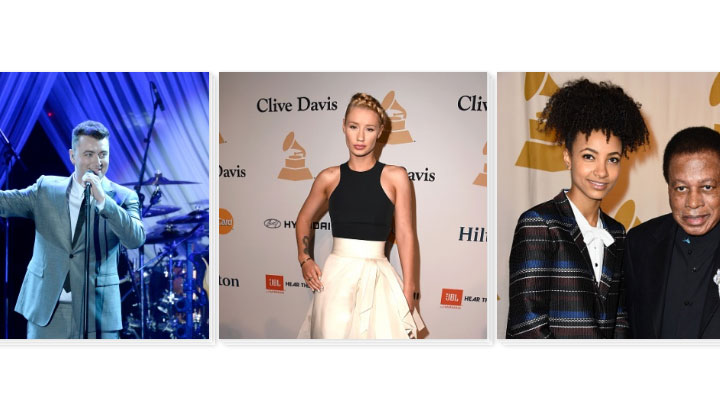Every year, music’s biggest stars gather to recognize excellence. The Grammy’s, an award show highlighting Grammy award winners (an accolade given by the National Academy of Recording Arts and Sciences) is known to pull out all the stops.
Beyond the glitz and flashing lights are invaluable lessons to be learned from (the fan-fare and) those recognized for their outstanding achievements in music.
Here’s a look at a seven star-studded business lessons for the entrepreneurially inclined:
-
You can turn pain into profit. (Tweet This)
Sam Smith “[who] had a huge night at the Grammy Awards on Sunday, picking up four awards” thanked his “ex who inspired the record ‘for breaking [his] heart cause it got [him] four Grammys.’” (The Washington Post)
If we were to poll entrepreneurs, or successful people in general, you will likely find that pain was, in fact, one of their greatest motivators. There are valuable lessons to be learned from facing obstacles.
Consider this: “Jim Carrey used to be homeless. Surfer, Bethany Hamilton had her arm bitten off by a shark. Richard Branson has dyslexia. Oprah Winfrey gave birth at age 14 and lost her child. Jay-Z couldn’t get signed to any record labels.” (The Huffington Post) And the list goes on. These are all very real obstacles, which can cause overwhelming pain. Yet, successful people show us, it seems, pain is a part of the process.
-
Cult followings can morph into mainstream success. (Tweet This)
Beck surprised everyone with an album of the year win for “Morning Phase.” And he proved that you should “be so good they can’t ignore you (Steve Martin).” “For two decades, the Los Angeles-bred rocker has won critical acclaim and a cult following — if not the mainstream success often recognized by the Grammys — with a discography that swings wildly in direction.” (Yahoo News)
Every brand wants to create a cult-like following and, like Beck, it starts with unrelenting focus and standing out from the crowd. Dave Llorens, Founder, CEO, 60-Day MBA explains: “Focus is key in all matters of effectiveness. Early on it is important to direct your efforts toward a particular niche in which you can find your early cult followers. This is where your tribe will grow from.” (The Huffington Post)
-
You don’t have all the answers Kanye. (Tweet This)
To no surprise, “Kanye West tried to upstage his own infamous award show moment as he ‘jokingly’ hopped on stage when Beck won out over Beyoncé.” But it wasn’t actually a joke.
“Kanye stopped by E!’s Grammy after-show with Kim and shared his true feelings about Beck’s win over Queen Bey. The gist: He was not pleased. ‘Beck needs to respect artistry and he should have given his award to Beyoncé,’ he said.” (The Washington Post)
Most entrepreneurs know how (and when) to give credit where credit is due. From publicity stunts, to well-or-ill-timed announcements, your relevance shouldn’t solely depend on your ability to cast a shadow on competitors (jokingly or not). You don’t have all of the answers Kanye.
-
More brands will take a stance on social issues, will you? (Tweet This)
“Meanwhile, even if Kanye was having a blast, the rest of the show featured a surprising amount of very serious performances… Case in point: Beyoncé closed out the show with “Take My Hand Precious Lord” … as a group of background performers held up their hands in a ‘hands up, don’t shoot’ image.” (The Washington Post) And President Obama, Katy Perry and others took initiative to end sexual assault on college campuses.
Showing solidarity can go a long way in the mindset of consumers. In the future, we will continue to see more and more brands take a stance on social issues. According to The Guardian, “Pro-social brands are the next step for companies looking to morally engage with consumers. Driven by marketers who are moving beyond claims of sustainability and into strong stands on relevant social issues, this trend picked up momentum in 2014. It will be positively explosive in 2015.”
Pro-social brands can be polarizing or profitable. “It’s all about the brand’s tolerance for risk and what they stand for overall,” said Mat Rednor, chief strategy and innovation officer of MRY. (Digiday) Studies suggest, “7 in 10 young adults consider themselves social activists … and “1 in 3 boycott or support businesses based on the causes they care about,” while “4 in 5 said they’d be more likely to purchase from a company that supports a cause they care about (if price and quality were equal) and 3 in 4 would think more highly of a company that supports a social cause.” (Crains Chicago Business)
© YFS Magazine. All Rights Reserved. Copying prohibited. All material is protected by U.S. and international copyright laws. Unauthorized reproduction or distribution of this material is prohibited. Sharing of this material under Attribution-NonCommercial-NoDerivatives 4.0 International terms, listed here, is permitted.




